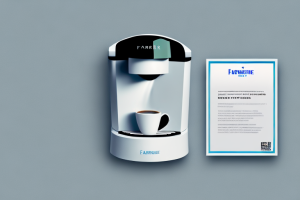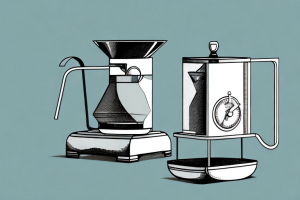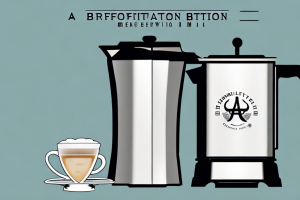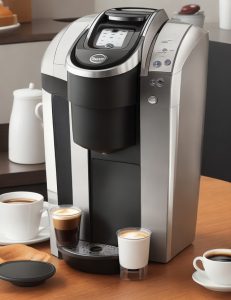Can You Make Tea In A Coffee Maker
9 min read
A coffee maker with a teapot placed on top of it
If you’re a tea lover but don’t have the time or patience to brew it the traditional way, or you’re in a pinch for brewing equipment, you’ve likely wondered: can you make tea in a coffee maker? The answer is yes! And in this article, we’ll explore the basics of making tea in a coffee maker, step-by-step instructions, the pros and cons of this method, choosing the right tea for your coffee maker, tips for achieving the perfect cup, mistakes to avoid, and more.
The Basics of Making Tea in a Coffee Maker
Before we dive into the nitty-gritty of brewing tea in a coffee maker, let’s quickly touch on the basics. Tea is essentially water infused with dried tea leaves, herbs, or fruits. The optimal temperature for steeping tea is between 175 and 212 degrees Fahrenheit, depending on the type of tea. Meanwhile, a coffee maker heats water to around 200 degrees Fahrenheit, making it quite suitable for making tea.
However, it’s important to note that not all coffee makers are created equal when it comes to making tea. Some coffee makers may have a lingering coffee taste or residue, which can affect the flavor of your tea. It’s recommended to thoroughly clean your coffee maker before using it to make tea, and to avoid using coffee grounds or filters in the process. Additionally, if you’re using loose leaf tea, it’s best to use a tea infuser or strainer to prevent any loose leaves from ending up in your cup.
Step-by-Step Guide to Brewing Tea in a Coffee Maker
Here’s a simple method for brewing tea in a coffee maker:
- Fill the coffee pot with cold water, as you would for making coffee.
- Add tea bags or loose tea leaves to the coffee maker’s filter basket. You’ll want to use one tea bag or one teaspoon of loose tea per cup of water.
- Start the coffee maker and wait for your tea to brew. The brewing time varies depending on the type of tea, but generally, you’ll want to let it steep for three to five minutes.
- Once the brewing is complete, remove the filter basket and dispose of the tea bags or tea leaves.
- Pour your tea into a cup, add any sweeteners, milk, or other flavorings you desire, and voila!
However, there are a few things to keep in mind when brewing tea in a coffee maker. Firstly, make sure to clean the coffee maker thoroughly before brewing tea, as any leftover coffee residue can affect the taste of your tea. Secondly, if you’re using loose tea leaves, consider using a tea infuser or a disposable tea bag to prevent the leaves from clogging the filter basket.
Additionally, you can experiment with different types of tea to find your perfect brew. Black tea, green tea, and herbal tea all have different brewing times and temperatures, so be sure to adjust accordingly. You can also try adding fresh herbs or spices to your tea for an extra flavor boost.
The Pros and Cons of Using a Coffee Maker to Make Tea
As with any brewing method, there are both advantages and disadvantages to brewing tea in a coffee maker. On the plus side, it’s incredibly easy and convenient, making it a great option when you’re in a hurry or short on space. It’s also relatively consistent, so you can expect to brew a decent cup of tea every time. However, some teas might not taste as good as when brewed using traditional methods, as the water temperature is often not ideal. Additionally, coffee makers that have been used for coffee may leave a flavor or aroma behind that can interfere with the tea’s taste.
Another advantage of using a coffee maker to brew tea is that it can be a cost-effective option. If you already have a coffee maker at home, you don’t need to invest in a separate tea brewing device. This can save you money in the long run, especially if you’re a frequent tea drinker.
On the other hand, using a coffee maker to brew tea may not be the most environmentally friendly option. Many coffee makers require disposable paper filters, which can contribute to waste. Additionally, some coffee makers use a lot of energy to heat the water, which can be wasteful if you’re only brewing a small amount of tea. If you’re concerned about your environmental impact, you may want to consider alternative brewing methods, such as using a stovetop kettle or a reusable tea infuser.
How to Choose the Right Type of Tea for Your Coffee Maker
While most types of tea can be brewed in a coffee maker, some may work better than others. Generally, tea bags or whole leaf teas work best, as they don’t leave a lot of debris behind that could clog your coffee maker’s filter. Black, green, and herbal teas are all good choices, but you’ll want to avoid delicate or high-end teas as the coffee maker’s high temperature can damage their subtler flavors.
If you’re looking for a stronger tea flavor, consider using loose leaf tea instead of tea bags. Loose leaf tea allows for more surface area to be exposed to the hot water, resulting in a stronger brew. However, be sure to use a fine mesh strainer or tea infuser to prevent any loose tea leaves from getting into your coffee maker.
Another factor to consider when choosing a tea for your coffee maker is the caffeine content. If you’re looking for a caffeine boost, black tea is a good choice as it contains the most caffeine. Green tea and herbal teas, on the other hand, contain less caffeine and may be a better option if you’re looking for a more relaxing beverage.
Tips for Achieving the Perfect Cup of Tea in Your Coffee Maker
To make the most of your coffee maker when brewing tea, here are some tips to keep in mind:
- If you’re using loose tea instead of bags, use a paper or reusable filter to prevent the leaves from floating into your cup.
- For the best taste, use fresh, filtered water that’s not too hard or too soft.
- If your tea tastes bitter, try reducing the brewing time or using less tea next time.
- Use only a clean coffee maker and make sure to run a cycle with just water after brewing tea to clean any residue left behind.
Another tip to keep in mind is to preheat your coffee maker before brewing tea. This will ensure that the water is at the right temperature for steeping the tea leaves. Simply run a cycle with just water before adding the tea.
Additionally, consider experimenting with different types of tea to find your perfect cup. Some coffee makers may work better with certain types of tea, such as black tea or herbal tea. Don’t be afraid to try different blends and flavors to find what works best for you.
Common Mistakes to Avoid When Making Tea in a Coffee Maker
Some common mistakes to avoid when brewing tea in a coffee maker include:
- Overfilling the coffee maker, which can lead to weak or under-extracted tea.
- Using coffee filters instead of proper tea filters, which can clog your coffee maker’s filter basket.
- Not cleaning the coffee maker properly after brewing tea, which can leave behind a funky taste or aroma.
Another mistake to avoid when making tea in a coffee maker is using the wrong temperature of water. Tea requires a specific temperature range to properly steep and release its flavors. Using water that is too hot can result in a bitter taste, while water that is too cold can result in a weak and flavorless tea.
It is also important to choose the right type of tea for brewing in a coffee maker. Some teas, such as herbal teas, may require a longer steeping time than others. Additionally, some teas may not be suitable for brewing in a coffee maker due to their delicate flavors or textures.
Creative Ways to Flavor Your Tea Made in a Coffee Maker
If you’re looking to spice up your coffee-maker-brewed tea, consider adding these tasty flavorings:
- Fresh herbs like mint or rosemary
- Slices of citrus fruit like lemon or orange
- Cinnamon sticks or nutmeg
- Honey or maple syrup
How to Clean Your Coffee Maker After Making Tea
Once you’re done brewing tea in your coffee maker, it’s crucial to clean it properly. Run a cycle of plain water through the machine to rinse out any residual tea or flavorings. Additionally, you’ll want to wash the pot and filter basket with warm, soapy water, making sure to get into any crevices or corners where debris might be hiding.
Comparing the Taste of Tea Made in a Coffee Maker vs Traditional Methods
While brewing tea in a coffee maker can be quick and convenient, some tea enthusiasts argue that it can’t quite match up to traditional brewing methods like using a teapot or a French press. This is because coffee makers often heat water to a higher temperature than ideal, which can damage some teas’ delicate flavor notes, and leave a metallic or chemical aftertaste. Additionally, coffee makers may not provide enough room for the tea leaves or bags to expand, resulting in a weaker cup of tea.
Can You Make Iced Tea In A Coffee Maker?
Absolutely! Making iced tea in a coffee maker follows the same basic steps as brewing hot tea, but with a few adjustments. For starters, you’ll want to use more tea leaves or bags than you would for hot tea, as the ice will dilute the strength. Additionally, you’ll want to wait for the tea to cool down before pouring it over ice, or the ice will melt immediately and water down your tea even further.
Using a Coffee Maker for Loose Leaf Tea: Dos and Don’ts
While you can certainly use loose leaf tea in a coffee maker, there are some dos and don’ts to keep in mind. Do use a paper or reusable filter to prevent the tea leaves from floating into your cup. Don’t overfill the filter basket, as this can cause the leaves to clog the filter and reduce the quality of your brew. Do experiment with various types of loose leaf tea and infusers to find the ones that work best with your coffee maker.
Experimenting with Different Types of Teas and Their Brews Using a Coffee Maker
Brewing tea in a coffee maker can be a fun opportunity to try out different types of teas and experiment with various brewing methods. Some teas that work particularly well with a coffee maker include black tea, green tea, and herbal tea blends. Consider trying out different brewing times, water temperatures, and steeping methods to find your ideal cup of tea.
The Environmental Impact of Making Tea in a Coffee Maker vs Traditional Methods
Finally, it’s important to consider the environmental impact of brewing tea in a coffee maker versus traditional methods. While coffee makers can be more efficient in terms of water usage, they also require more electricity to run, which can increase your carbon footprint. Using a traditional kettle, on the other hand, consumes less electricity but may require more water usage for boiling. Additionally, consider choosing loose-leaf teas or biodegradable tea bags to reduce waste; avoid using plastic tea bags, which can take years to break down in landfills.
Final Thoughts: Is Making Tea In A Coffee Maker Worth It?
All things considered, brewing tea in a coffee maker is an excellent option when you’re short on time, space, or equipment. It’s easy, convenient, and can produce a decent cup of tea. However, it’s worth noting that some teas may not taste quite as good as when brewed using traditional methods, particularly those that are more delicate or high-end. Ultimately, the choice of whether or not to make tea in a coffee maker comes down to personal preferences and needs.



